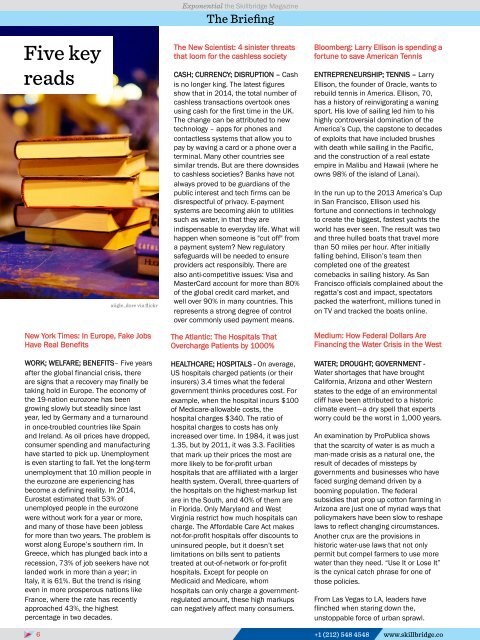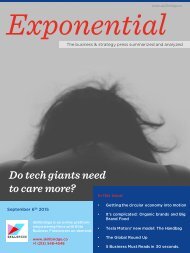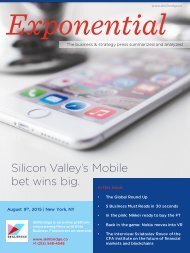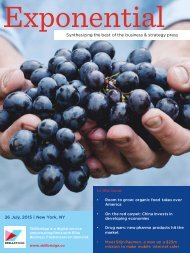Exponential -- June 14, 2015
In this issue, we discuss the global war for talent and the freelance platforms that are driving this talent revolution, South Korea's rapidly growing startup scene, the decline of the postal service, and why shipping firms must continue to innovate. We also feature an exclusive interview with Deb Cupp, SVP and General Manager for HR at SAP, who discusses how human resources solutions can be more seamlessly integrated into companies.
In this issue, we discuss the global war for talent and the freelance platforms that are driving this talent revolution, South Korea's rapidly growing startup scene, the decline of the postal service, and why shipping firms must continue to innovate. We also feature an exclusive interview with Deb Cupp, SVP and General Manager for HR at SAP, who discusses how human resources solutions can be more seamlessly integrated into companies.
You also want an ePaper? Increase the reach of your titles
YUMPU automatically turns print PDFs into web optimized ePapers that Google loves.
The Briefing<br />
The Briefing<br />
<strong>Exponential</strong> the Skillbridge Magazine<br />
Five key<br />
reads<br />
aiigle_dore via flickr<br />
The New Scientist: 4 sinister threats<br />
that loom for the cashless society<br />
CASH; CURRENCY; DISRUPTION – Cash<br />
is no longer king. The latest figures<br />
show that in 20<strong>14</strong>, the total number of<br />
cashless transactions overtook ones<br />
using cash for the first time in the UK.<br />
The change can be attributed to new<br />
technology – apps for phones and<br />
contactless systems that allow you to<br />
pay by waving a card or a phone over a<br />
terminal. Many other countries see<br />
similar trends. But are there downsides<br />
to cashless societies? Banks have not<br />
always proved to be guardians of the<br />
public interest and tech firms can be<br />
disrespectful of privacy. E-payment<br />
systems are becoming akin to utilities<br />
such as water, in that they are<br />
indispensable to everyday life. What will<br />
happen when someone is "cut off" from<br />
a payment system? New regulatory<br />
safeguards will be needed to ensure<br />
providers act responsibly. There are<br />
also anti-competitive issues: Visa and<br />
MasterCard account for more than 80%<br />
of the global credit card market, and<br />
well over 90% in many countries. This<br />
represents a strong degree of control<br />
over commonly used payment means.<br />
Bloomberg: Larry Ellison is spending a<br />
fortune to save American Tennis<br />
ENTREPRENEURSHIP; TENNIS – Larry<br />
Ellison, the founder of Oracle, wants to<br />
rebuild tennis in America. Ellison, 70,<br />
has a history of reinvigorating a waning<br />
sport. His love of sailing led him to his<br />
highly controversial domination of the<br />
America’s Cup, the capstone to decades<br />
of exploits that have included brushes<br />
with death while sailing in the Pacific,<br />
and the construction of a real estate<br />
empire in Malibu and Hawaii (where he<br />
owns 98% of the island of Lanai).<br />
In the run up to the 2013 America’s Cup<br />
in San Francisco, Ellison used his<br />
fortune and connections in technology<br />
to create the biggest, fastest yachts the<br />
world has ever seen. The result was two<br />
and three hulled boats that travel more<br />
than 50 miles per hour. After initially<br />
falling behind, Ellison’s team then<br />
completed one of the greatest<br />
comebacks in sailing history. As San<br />
Francisco officials complained about the<br />
regatta’s cost and impact, spectators<br />
packed the waterfront, millions tuned in<br />
on TV and tracked the boats online.<br />
New York Times: In Europe, Fake Jobs<br />
Have Real Benefits<br />
WORK; WELFARE; BENEFITS– Five years<br />
after the global financial crisis, there<br />
are signs that a recovery may finally be<br />
taking hold in Europe. The economy of<br />
the 19-nation eurozone has been<br />
growing slowly but steadily since last<br />
year, led by Germany and a turnaround<br />
in once-troubled countries like Spain<br />
and Ireland. As oil prices have dropped,<br />
consumer spending and manufacturing<br />
have started to pick up. Unemployment<br />
is even starting to fall. Yet the long-term<br />
unemployment that 10 million people in<br />
the eurozone are experiencing has<br />
become a defining reality. In 20<strong>14</strong>,<br />
Eurostat estimated that 53% of<br />
unemployed people in the eurozone<br />
were without work for a year or more,<br />
and many of those have been jobless<br />
for more than two years. The problem is<br />
worst along Europe’s southern rim. In<br />
Greece, which has plunged back into a<br />
recession, 73% of job seekers have not<br />
landed work in more than a year; in<br />
Italy, it is 61%. But the trend is rising<br />
even in more prosperous nations like<br />
France, where the rate has recently<br />
approached 43%, the highest<br />
percentage in two decades.<br />
The Atlantic: The Hospitals That<br />
Overcharge Patients by 1000%<br />
HEALTHCARE; HOSPITALS - On average,<br />
US hospitals charged patients (or their<br />
insurers) 3.4 times what the federal<br />
government thinks procedures cost. For<br />
example, when the hospital incurs $100<br />
of Medicare-allowable costs, the<br />
hospital charges $340. The ratio of<br />
hospital charges to costs has only<br />
increased over time. In 1984, it was just<br />
1.35, but by 2011, it was 3.3. Facilities<br />
that mark up their prices the most are<br />
more likely to be for-profit urban<br />
hospitals that are affiliated with a larger<br />
health system. Overall, three-quarters of<br />
the hospitals on the highest-markup list<br />
are in the South, and 40% of them are<br />
in Florida. Only Maryland and West<br />
Virginia restrict how much hospitals can<br />
charge. The Affordable Care Act makes<br />
not-for-profit hospitals offer discounts to<br />
uninsured people, but it doesn’t set<br />
limitations on bills sent to patients<br />
treated at out-of-network or for-profit<br />
hospitals. Except for people on<br />
Medicaid and Medicare, whom<br />
hospitals can only charge a governmentregulated<br />
amount, these high markups<br />
can negatively affect many consumers.<br />
Medium: How Federal Dollars Are<br />
Financing the Water Crisis in the West<br />
WATER; DROUGHT; GOVERNMENT -<br />
Water shortages that have brought<br />
California, Arizona and other Western<br />
states to the edge of an environmental<br />
cliff have been attributed to a historic<br />
climate event — a dry spell that experts<br />
worry could be the worst in 1,000 years.<br />
An examination by ProPublica shows<br />
that the scarcity of water is as much a<br />
man-made crisis as a natural one, the<br />
result of decades of missteps by<br />
governments and businesses who have<br />
faced surging demand driven by a<br />
booming population. The federal<br />
subsidies that prop up cotton farming in<br />
Arizona are just one of myriad ways that<br />
policymakers have been slow to reshape<br />
laws to reflect changing circumstances.<br />
Another crux are the provisions in<br />
historic water-use laws that not only<br />
permit but compel farmers to use more<br />
water than they need. “Use It or Lose It”<br />
is the cynical catch phrase for one of<br />
those policies.<br />
From Las Vegas to LA, leaders have<br />
flinched when staring down the,<br />
unstoppable force of urban sprawl.<br />
6 +1 (212) 548 4548 www.skillbridge.co











